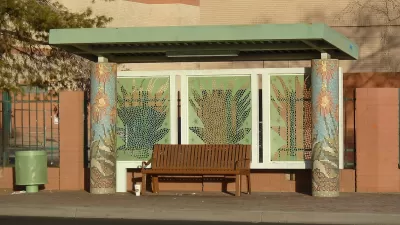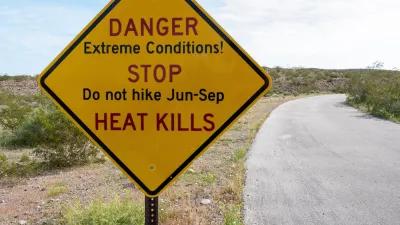As heat waves intensify, cities are seeking out heat mitigation techniques that can be applied widely and benefit entire neighborhoods.

With extreme heat becoming a severe health risk in more U.S. cities, local governments are looking for ways to mitigate its impacts at larger scales, reports Ysabelle Kempe in Smart Cities Dive. “Five cities — Atlanta, Boston, Dallas, New Orleans and Columbia, South Carolina — will participate in a three-year project to scale up the adoption of surfaces that reduce urban heat, the nonprofit Smart Surfaces Coalition announced Thursday.”
The project is aimed at reducing barriers to scaling up heat mitigation projects to make a difference at the neighborhood level. “The coalition’s analysis of citywide ‘smart surfaces’ adoption in Baltimore found that the strategy could cool the city by 5 degrees Fahrenheit and provide more than $10 in cost savings for every $1 spent.”
Kurt Shickman, director of extreme heat initiatives at the Adrienne Arsht-Rockefeller Foundation Resilience Center, explains the challenges, saying, “a city may not be able to plant trees where they would provide the most value if the land is private property or owned by, say, a water utility or public transportation authority. Shickman suggested that cities could develop incentives or even regulation to encourage cooling changes to the built environment.”
The Smart Surfaces Coalition says it can fund ten projects and welcomes applications from more cities.
FULL STORY: These 5 cities aim to cool down by scaling up ‘smart surfaces’ in coming years

Planetizen Federal Action Tracker
A weekly monitor of how Trump’s orders and actions are impacting planners and planning in America.

San Francisco's School District Spent $105M To Build Affordable Housing for Teachers — And That's Just the Beginning
SFUSD joins a growing list of school districts using their land holdings to address housing affordability challenges faced by their own employees.

The Tiny, Adorable $7,000 Car Turning Japan Onto EVs
The single seat Mibot charges from a regular plug as quickly as an iPad, and is about half the price of an average EV.

Seattle's Plan for Adopting Driverless Cars
Equity, safety, accessibility and affordability are front of mind as the city prepares for robotaxis and other autonomous vehicles.

As Trump Phases Out FEMA, Is It Time to Flee the Floodplains?
With less federal funding available for disaster relief efforts, the need to relocate at-risk communities is more urgent than ever.

With Protected Lanes, 460% More People Commute by Bike
For those needing more ammo, more data proving what we already knew is here.
Urban Design for Planners 1: Software Tools
This six-course series explores essential urban design concepts using open source software and equips planners with the tools they need to participate fully in the urban design process.
Planning for Universal Design
Learn the tools for implementing Universal Design in planning regulations.
Smith Gee Studio
City of Charlotte
City of Camden Redevelopment Agency
City of Astoria
Transportation Research & Education Center (TREC) at Portland State University
US High Speed Rail Association
City of Camden Redevelopment Agency
Municipality of Princeton (NJ)





























